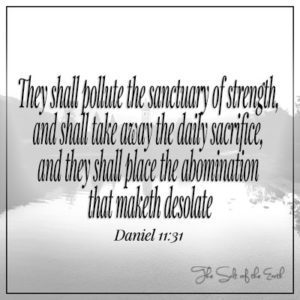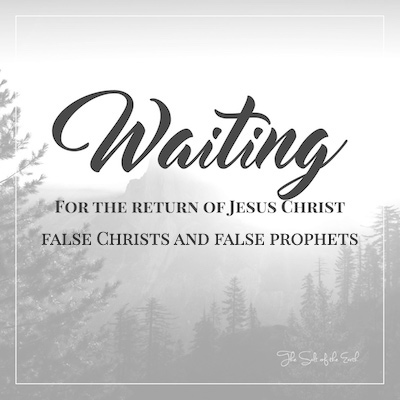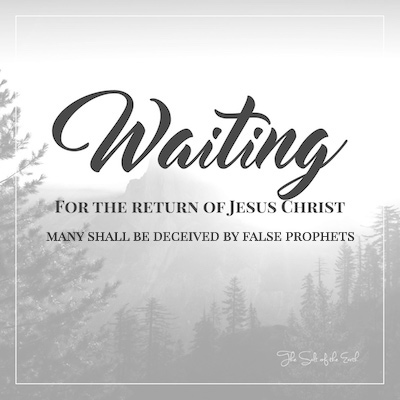When Jesus spoke to His disciples about the end times, Jesus mentioned the abomination of desolation, which was spoken of by Daniel (Mathewu 24:15). What is the abomination of desolation according to the Bible?
What is the abomination of desolation in the Book of Daniel?
When ye therefore shall see the abomination of desolation, spoken of by Daniel the prophet, stand in the holy place, (whoso breadth, let him understand:) Then let them which be in Judaea flee into the mountains: Let him which is on the housetop not come down to take any thing out of his house: Neither let him which is in the field return back to take his clothes. And woe unto them that are with child, and to them that give suck in those days! But pray ye that your flight be not in the winter, neither on the sabbath day: For then shall be great tribulation, such as was not since the beginning of the world to this time, no, nor ever shall be. And except those days should be shortened, there should no flesh be saved: but for the elect’s sake those days shall be shortened(Mathewu 24:15-22)
Jesus mentioned the abomination of desolation, which was spoken of by the prophet Daniel. Daniel spoke about the abomination of desolation. Therefore to understand what Jesus meant by the abomination of desolation, we have to look at the Book of Daniel. Let’s have a look at the three passages, where Daniel spoke about the abomination of desolation.
After threescore and two weeks shall Messiah be cut off, but not for himself: and the people of the prince that shall come shall destroy the city and the sanctuary; and the end thereof shall be with a flood, and unto the end of the war desolations are determined. And he shall confirm the covenant with many for one week: and in the midst of the week he shall cause the sacrifice and the oblation to cease, and for the overspreading of abominations he shall make it desolate, even until the consummation, and that determined shall be poured upon the desolate (UDaniyeli 9:26-27)
At the time appointed he shall return, and come toward the south; but it shall not be as the former, or as the latter. For the ships of Chittim shall come against him: therefore he shall be grieved, and return, and have indignation against the holy covenant: so shall he do; he shall even return, and have intelligence with them that forsake the holy covenant. And arms shall stand on his part, and they shall pollute the sanctuary of strength, and shall take away the daily sacrifice, and they shall place the abomination that maketh desolate (UDaniyeli 11:29-31)
From the time that the daily sacrifice shall be taken away, and the abomination that maketh desolate set up, there shall be a thousand two hundred and ninety days (UDaniyeli 12:11)
What is the abomination of desolation in the Old Testament?
In the Old Testament, the abomination often referred to an idol, izithombe, or objects that belonged to a cult of idol worshipping. But it also referred to things, which the people of God committed that aroused the abhorrence of the Lord (i.e. Isaya 66:3, 2 Chronicles 23:13-14).
In Daniel 11 futhi 12, the desolation referred to the same thing. The desolation referred to the temple desecration of Antiochus Epiphanes, the king of Greco-Syria (175-164 BC).
Antiochus desecrated the temple by putting the image of Zeus, the Greek god, or of Baal, the Zeus of Syria, in the temple of Jerusalem. They then forced the Jews with violence to accept the Greek culture and religion and worship the Greek gods; idols. The people, who didn’t want to accept this religion were persecuted.
The temple was desecrated and the temple service for the Lord was not executed anymore.
The Jews that stayed faithful to God and didn’t accept this religion were persecuted and banished from the temple.
In Daniel chapter 9, we read that on the wing of abominations, one will come, who makes desolate. Even until the complete destruction. One that is decreed, is poured out on the one who causes the horror.
The temple desecration
KuMathewu 24:15, Jesus spoke about the desolation abomination and not about abominations (plural). Therefore we can assume that Jesus was referring to Daniel 11 futhi 12; to the temple desecration.
Ezekiel also speaks about the desolation in the sanctuary by worshipping idols (UHezekeli 8:6,9,10,13,17; 9:4).
When someone desecrates the temple, it means the end of the temple service. This is the desolation.
Just like Antiochus Epiphanies, who put an image of his god in the temple and because of that the sanctuary was desecrated, so will it also be in the end times. When the temple, ibandla, will be desecrated.
When we look at many churches, we already see this happening.
The church has become a social entertaining business, where everything revolves around man and pleasing the carnal people.
Seducing spirits have entered the lives of people, whereby izimfundiso zamadimoni are preached. The words in the Bible are taken out of context. They change and adjust the words to the will, izinkanuko, and desires of the carnal people. Some local churches have already thrown out the Word from the church, because the Word offends the feelings of people. (Funda futhi: Jesus thrown out of the church).
Has the church succumbed to the wisdom and knowledge of the world?
Many churches have succumbed to the wisdom and knowledge of the world aka science, which derives from the Greek culture (philosophy), and have allowed the world in the church. The devil, who is the ruler of the world and prince of the air, is seated in many churches. He deceives Christians and make them walk in his will. (Funda futhi: Intando kaNkulunkulu vs intando kadeveli).
And so the world church is being prepared for the coming of the antichrist. (Funda futhi: How the world church is being prepared for the coming of the antichrist).
Jesus said to His disciples, when they would see the abomination of desolation stand in the holy place, the people in Judea had to flee to the mountains.
There shall be great tribulation, like never before, nor shall there ever be such a great tribulation.
UJesu wathi, that if those days wouldn’t be shortened, no flesh would be saved. But for the elect’s sake, those days shall be shortened.
‘Yibani usawoti womhlaba’




